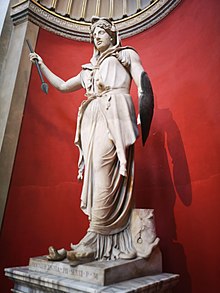
Back Juno (mitologie) Afrikaans Iuno ALS Chuno AN جونو (أسطورة) Arabic جونو ARZ Yunona Azerbaijani Юнона Bashkir Юнона Byelorussian Юнона Bulgarian জুনো (দেবী) Bengali/Bangla
| Juno | |
|---|---|
Queen of the Gods Goddess of marriage and childbirth | |
| Member of the Capitoline Triad and the Dii Consentes | |
 Juno Sospita, a plaster cast based on an original in the Vatican Museums | |
| Other names | Regina ("Queen") |
| Genealogy | |
| Parents | Saturn and Ops |
| Siblings | Jupiter, Neptune, Pluto, Ceres, Vesta |
| Consort | Jupiter |
| Children | Mars, Vulcan, Bellona, Lucina, Juventas |
| Equivalents | |
| Etruscan | Uni |
| Greek | Hera |
Juno (English: /ˈdʒuːnoʊ/ JOO-noh; Latin Iūnō [ˈjuːnoː]) was an ancient Roman goddess, the protector and special counsellor of the state. She was equated to Hera, queen of the gods in Greek mythology and a goddess of love and marriage. A daughter of Saturn and Ops, she was the sister and wife of Jupiter and the mother of Mars, Vulcan, Bellona, Lucina and Juventas. Like Hera, her sacred animal was the peacock.[1] Her Etruscan counterpart was Uni, and she was said to also watch over the women of Rome.[2] As the patron goddess of Rome and the Roman Empire, Juno was called Regina ("Queen") and was a member of the Capitoline Triad (Juno Capitolina), centered on the Capitoline Hill in Rome, and also including Jupiter, and Minerva, goddess of wisdom.

Juno's own warlike aspect among the Romans is apparent in her attire. She was often shown armed and wearing a goatskin cloak. The traditional depiction of this warlike aspect was assimilated from the Greek goddess Athena, who bore a goatskin, or a goatskin shield, called the Aegis. Juno was also shown wearing a diadem.
- ^ Larousse Desk Reference Encyclopedia, The Book People, Haydock, 1995, p. 215.
- ^ Corbishley, Mike Ancient Rome Warwick Press 1986 p.62